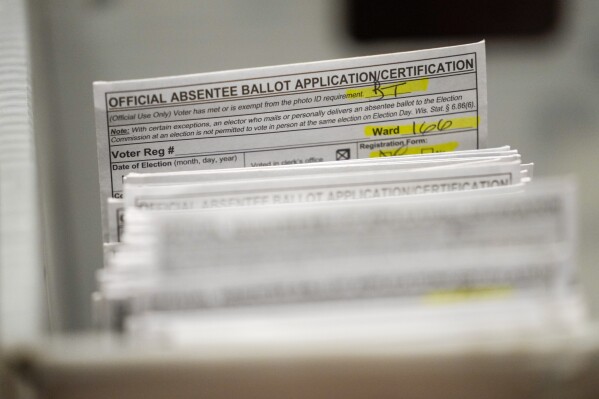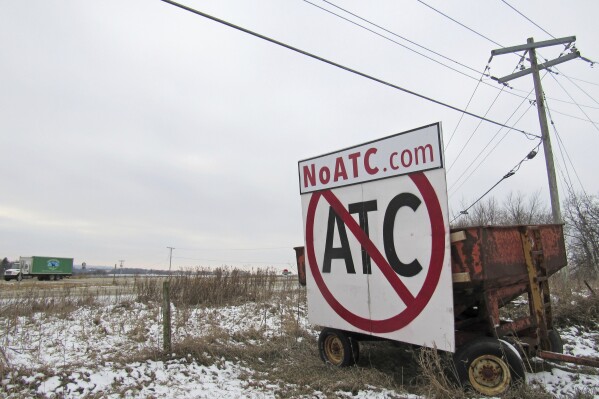Wisconsin Supreme Court considers expanding use of absentee ballot drop boxes
MADISON, Wis. (AP) — The Wisconsin Supreme Court is scheduled to hear arguments Monday in a case pushed by Democrats to overturn a ruling that all but eliminated the use of absentee ballot drop boxes in the swing state.
The court’s ruling will come within three months of the Aug. 13 primary and within six months of the November presidential election. A reversal could have implications on what is expected to be another razor-thin presidential race in Wisconsin.
President Joe Biden defeated Donald Trump in Wisconsin by just under 21,000 votes in 2020, four years after Trump narrowly took the state by a similar margin.
Since his defeat, Trump had claimed without evidence that drop boxes led to voter fraud. Democrats, election officials and some Republicans argued the boxes are secure.
At issue is whether to overturn the Wisconsin Supreme Court’s July 2022 ruling that said nothing in state law allowed for absentee drop boxes to be placed anywhere other than in election clerk offices. Conservative justices controlled the court then, but the court flipped to liberal control last year, setting the stage to possibly overturn the ruling.
Changing the ruling now “threatens to politicize this Court and cast a pall over the election” and unleash a new wave of legal challenges, attorneys for the Republican National Committee and Wisconsin Republican Party argued in court filings.



There have been no changes in the facts or the law to warrant overturning the ruling and it’s too close to the election to make changes now anyway, they contend.
What to know about the 2024 Election
- Democracy: American democracy has overcome big stress tests since 2020. More challenges lie ahead in 2024.
- AP’s Role: The Associated Press is the most trusted source of information on election night, with a history of accuracy dating to 1848. Learn more.
- Read the latest: Follow AP’s complete coverage of this year’s election.
Democrats argue the court misinterpreted the law in its 2022 ruling by wrongly concluding that absentee ballots can only be returned to a clerk in their office and not to a drop box they control that is located elsewhere. Clerks should be allowed “to decide for themselves how and where to accept the return of absentee ballots,” attorneys argue in court filings.
Priorities USA, a liberal voter mobilization group, and the Wisconsin Alliance for Retired Voters asked the court to reconsider the 2022 ruling. Democratic Gov. Tony Evers and the Wisconsin Elections Commission, which administers elections, support overturning it.
Attorneys for the groups that brought the challenge say in court filings that drop boxes became controversial only “when those determined to cast doubt on election results that did not favor their preferred candidates and causes made them a political punching bag.”
Election officials from four counties, including the two largest and most heavily Democratic in the state, filed a brief in support of overturning the ruling. They argue absentee ballot drop boxes have been used for decades without incident as a secure way for voters to return their ballots.
More than 1,600 absentee ballots arrived at clerks’ offices after Election Day in 2022, when drop boxes were not in use, and therefore were not counted, Democratic attorneys noted in their arguments. But in 2020, when drop boxes were in use and nearly three times as many people voted absentee, only 689 ballots arrived after the election.
Drop boxes were used in 39 other states during the 2022 election, according to the Stanford-MIT Healthy Elections Project.
The popularity of absentee voting exploded during the pandemic in 2020, with more than 40% of all voters in Wisconsin casting mail ballots, a record high. More than 500 drop boxes were set up in more than 430 communities for the election that year, including more than a dozen each in Madison and Milwaukee, the state’s two most heavily Democratic cities.
Disclaimer: The copyright of this article belongs to the original author. Reposting this article is solely for the purpose of information dissemination and does not constitute any investment advice. If there is any infringement, please contact us immediately. We will make corrections or deletions as necessary. Thank you.





